9 Best Skincare Ingredients For Eczema
9 Best Skincare Ingredients For Eczema
Determining whether you have eczema can be tricky. Dry, itchy skin can be normal during the winter when you spend a lot of time indoors exposed to dry air, don’t drink enough water or skip applying lotion to your skin regularly. However, if no amount of hydration and healthy habits heal your dry, itchy skin, there’s a good chance something’s going on under the surface. Unlike temporarily dry skin, eczema flare-ups can occur from everyday self-care products like shampoo, conditioner, soaps and laundry detergents. Even if you don’t have eczema on your scalp, lathering hair care products can flare up eczema on your face (near the hairline) or your hands and body when ingredients touch your skin.
Eczema (also called atopic dermatitis) is a chronic inflammatory skin condition that disrupts the skin barrier and causes uncomfortable symptoms like dryness, redness, itchiness, rashes, scaly patches, blisters and open sores. It is a common skin disorder that affects up to 15-20% of children and 1-3% of adults worldwide. While it is most prevalent in children and tends to lessen with age, eczema is often a lifelong condition that can be managed, not cured.

When seeking out the right eczema treatment for you, over-the-counter and prescription eczema creams are an effective option to keep your flare-ups under control. For daily management, consider all of your consumption habits – from your skincare and fragrance choices to your diet and household cleaning products. The ingredients you incorporate in your routine matter, whether it's in a product or used their own as home remedies for eczema.
Read on to learn more about the best skincare ingredients for eczema treatment to manage or reduce flare-ups to achieve smooth, soothed and healthy skin.
Aloe Vera
Alongside its cooling effects, aloe vera gel is rich in antioxidants and deeply moisturizes the skin. Together, these benefits reduce inflammation, nourish dry, scaly patches and help heal other symptoms commonly associated with eczema flare-ups. The plant’s hydrating benefits soothe broken skin and help relieve the severe itchiness that often accompanies eczema. These antioxidants provide an anti-inflammatory, immune-boosting effect to stimulate cellular turnover and accelerate wound healing. This process protects the damaged skin and keeps the moisture barrier hydrated while the top layer of skin gets resurfaced with healthy, resilient cells. Aloe vera also contains anti-bacterial and antifungal benefits to protect your broken or bleeding skin, which is already more prone to infection.

Credit: Etsy/Pinterest
You can use the gel straight from the aloe vera leaf or apply an aloe vera-containing cream to help manage your eczema. Wash your skin with mild, fragrance-free soap and lukewarm water before applying the aloe vera product. Use aloe vera twice daily on the skin for best results.
Read more on the benefits of aloe vera for your skin HERE.
Colloidal Oatmeal
This soothing eczema treatment has been used for centuries for a reason. Colloidal oatmeal helps protect the skin barrier to retain moisture and is clinically proven to heal eczema-induced dry, itchy and irritated skin. A 2012 study found that, after 4 weeks, colloidal oatmeal significantly improved eczema symptoms and severity when applied twice a day. Colloidal oatmeal is an emollient, a product made to soften or smoothen the skin, to offer quick itch relief and hydration.
Oatmeal is full of antioxidants that provide the same anti-inflammatory benefits – whether you consume them for breakfast or for healing broken skin. It contains avenanthramides, a compound that blocks the response of inflammatory cytokine proteins that helps soothe redness and irritation from eczema while repairing the damaged moisture barrier.
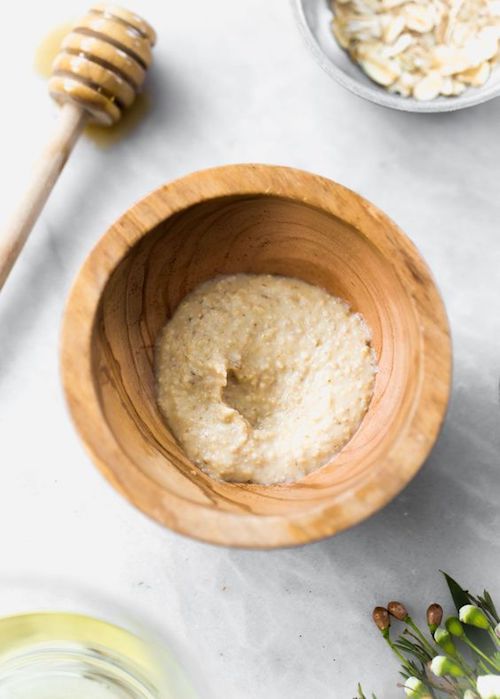
Credit: Broma Bakery/Pinterest
The most common way to use colloidal oatmeal for eczema treatment is to soak in an oatmeal bath. To draw this healing bath, mix either a store-bought or homemade colloidal oatmeal powder with warm water. For a quick and cheap home remedy for eczema, grind 1 cup of oats in a blender until it looks like a fine powder. Test a tablespoon in a glass of warm water to ensure the oat powder creates a milky consistency. Continue to grind the oats if they’re still grainy. Add the colloidal oatmeal product of your choice in the tub of warm water and let your skin soak in the mixture for around 10 minutes. This process should make your skin feel calmer and appear less inflamed, red or scaly.
Ceramides
Ceramides are long-chain fatty acids called lipids that make up to around 50% of your skin’s epidermis (the top layer of skin). They work with cholesterol and other fatty acids to keep your skin hydrated and fill in the space between your cells to maintain a healthy skin barrier. Proper skin barrier function is essential to retain moisture and prevent water loss, dryness or inflammation. While your skin naturally produces ceramides, these fatty acid reserves decrease – and can weaken your skin barrier – over time. Eczema is caused by skin barrier dysfunction, making it unsurprising that individuals with eczema tend to have fewer ceramides in their skin.

Ceramides restore the skin’s water permeability (essentially lock in moisture) to provide immediate hydration and repair the skin barrier in the long term to promote cellular turnover, skin elasticity, keep skin smooth and reduce inflammation. A strong skin barrier plays a crucial role in managing eczema flare-ups and protecting against cracking, redness, irritation, soreness, roughness, itchiness and other uncomfortable eczema symptoms.
Many eczema creams, lotions and moisturizers contain ceramides (often with other nourishing ingredients like colloidal oatmeal or hyaluronic acid) to help hydrate and restore the skin barrier. Pair these ceramide-containing creams with a gentle, hypoallergenic cleanser to manage your eczema long-term.
Coconut Oil
Coconut oil contains linoleic acid (also called vitamin F), an essential component of ceramides, to repair and protect the skin barrier. These fatty acids hydrate the skin to help retain moisture and prevent water loss to reduce skin barrier dysfunction. Along with its hydrating properties, coconut oil contains anti-inflammatory and anti-bacterial benefits. The antioxidants help stimulate cell turnover, keep irritants out and speed up wound healing. Coconut oil effectively reduces eczema symptoms because it moisturizes the dry, scaly patches to reduce redness, improves cracked, rough skin texture and has antimicrobial properties to prevent infection.
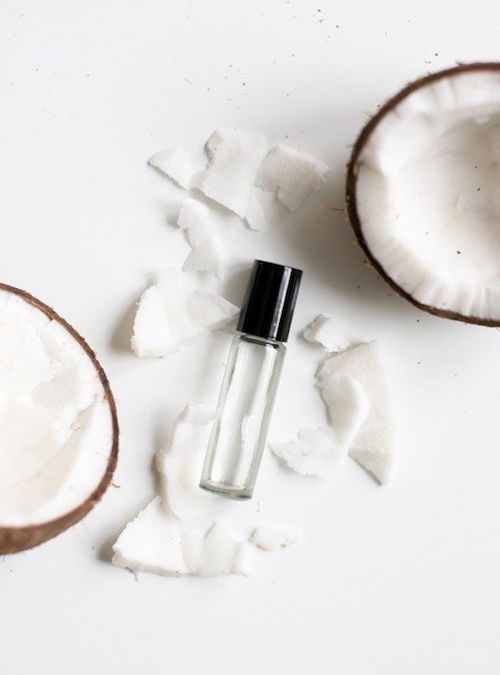
Credit: Hello Glow/Pinterest
Research supports the effectiveness of coconut oil as a natural remedy for eczema treatment. A 2019 study found clinical evidence that virgin coconut oil’s anti-inflammatory effect enhances skin barrier function. Another 2013 study overseeing 117 children found that coconut oil is more effective than mineral oil in treating mild to moderate eczema symptoms in young patients. Finally, a 2008 study conducted among adult eczema sufferers saw a 95% reduction in bacteria colonization (or presence of bacteria) when they applied coconut oil to the skin twice a day. This last study is significant to show that using coconut oil for eczema can significantly reduce the risk of bacterial infection while the skin barrier repairs itself to protect against future irritants.
Always use cold-pressed or virgin coconut oil on the skin. Coconut oil is solid at room temperature, so it will be easier to apply if you warm it up slightly by rubbing it in-between your fingers before use. If you’re allergic to any type of nuts (especially hazelnuts or walnuts), be careful before using coconut oil topically.
Hyaluronic Acid
Like ceramides, hyaluronic acid is essential for healthy, hydrated skin. Hyaluronic acid is a sugar molecule responsible for absorbing and locking moisture into the skin (which can hold up to 1,000 times its weight in water). It is classified as a humectant – meaning that hyaluronic acid works by drawing water into the skin. Unlike ceramides, hyaluronic acid traps – rather than adds – moisture for the skin. Many eczema creams, lotions and other treatments combine these compounds to boost the product’s efficacy.
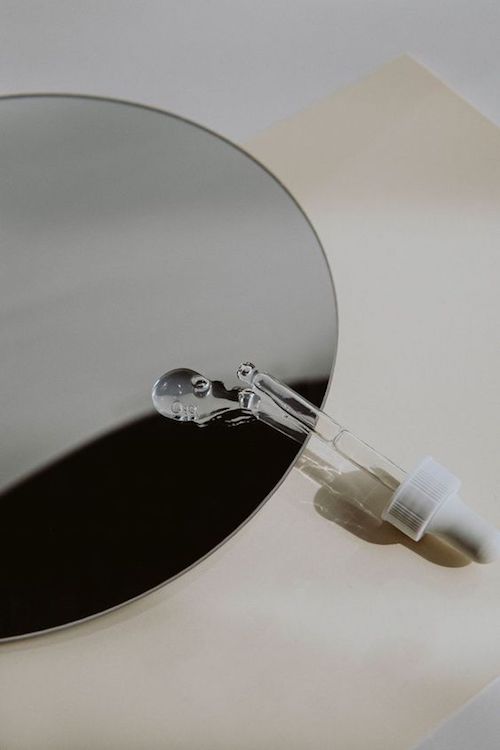
Credit: The Klog/Pinterest
Some benefits of hyaluronic acid include preventing dry, itchy skin, improving skin elasticity, smoothing rough skin texture and promoting wound healing. In a 2014 study, researchers found that hyaluronic acid (when applied topically) improved skin hydration by 96% and skin elasticity by 55% after 8 weeks. These findings confirm hyaluronic acid’s skin barrier strengthening benefits and ability to reduce the severity of common eczema symptoms.

A 2011 study found a hyaluronic acid cleanser (in foam form) significantly improved the participants' eczema symptoms and skin barrier function by the second week of use. Hyaluronic acid is generally recommended as a suitable treatment option for mild to moderate eczema.
If you’re curious to learn more, here’s everything you could want to know about hyaluronic acid.
Glycerin
Glycerin is a non-toxic, colourless alcoholic derived from either vegetable oils (like the ones used in Zensa Healing Cream) or animal fats. It is a humectant that attracts water and moisturizes the skin – leaving your complexion soft, supple and hydrated. Glycerin is known to increase cellular turnover and accelerate wound healing. It is known to help repair the skin barrier and, as a 2002 study confirmed, is a beneficial treatment for eczema and atopic dermatitis.
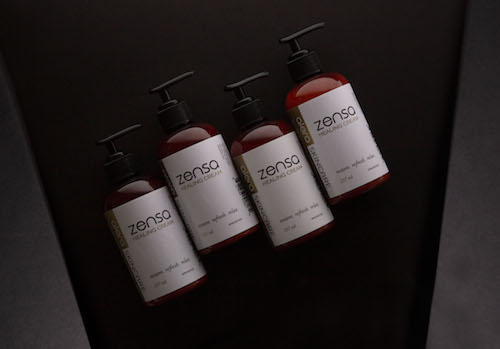
This natural alcohol has been used in skin care products for decades. Zensa Healing Cream combines this moisture-retaining compound with nourishing ingredients like shea butter, hyaluronic acid, Calendula and grapefruit oil, aloe vera cucumber extract and more. When combined, these natural remedies help reduce skin irritation, accelerate wound healing during the tattoo and permanent healing processes, relieve conditions like eczema, hydrate dry skin and more.
Niacinamide
Niacinamide is one of the forms of vitamin B3, an essential nutrient to maintain healthy skin, energy levels and other bodily functions. It promotes ceramide production to lock in moisture, prevent water loss and strengthen your skin barrier – which, as you know by now, is essential to managing eczema symptoms. Niacinamide contains anti-inflammatory properties to alleviate eczema-related redness and blotchiness on your skin. It also provides considerable hydration, thanks to its lipid-production benefits. This increase in moisture helps smooth out and restore rough, scaly patches, inflammation, uneven skin texture and leathery skin from eczema flare-ups. Pair it with hyaluronic acid to boost the rate of niacinamide absorption and its effects.
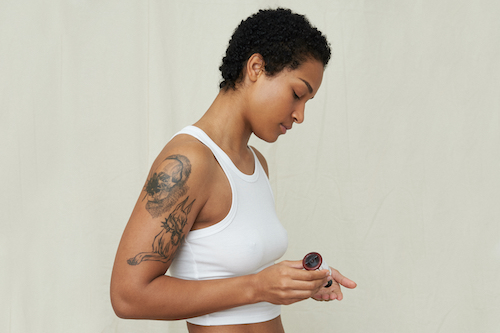
When shopping for a serum, keep in mind that a higher niacinamide concentration does not guarantee better results. While there are plenty of products on the market containing up to 10% niacinamide, these highly-concentrated products can lead to skin irritation, especially those with sensitive skin. 5% niacinamide is considered the optimal concentration for best results.
Petroleum Jelly
Even if you haven’t heard of slugging, chances are you own a tube of Vaseline – arguably the most popular Petroleum jelly. This ingredient is an emollient, meaning that it locks in moisture to fill in the moisture gaps (lipids) that leave you with dry skin, flaky patches and a weakened skin barrier. Petroleum jelly is often praised as one of the most effective, gentle and accessible eczema treatment options. A 2017 study found that fully covering skin with petroleum jelly can prevent eczema flare-ups. Slugging, coating your entire face in petroleum jelly overnight, is a popular trend that follows these findings and works to help eczema symptoms or heal dry skin.

Credit: Total Beauty/Pinterest
It repairs and strengthens the skin barrier to calm inflammation or prevent future flare-ups. Petroleum jelly is ultra-hydrating to soothe itchy, cracked or irritated skin and prevents scab formation to accelerate wound healing. It also contains anti-bacterial, anti-fungal and anti-inflammatory properties to prevent infection while clearing up the skin.
Sunflower Oil
Sunflower seed oil helps reduce common eczema symptoms like skin irritation, itchiness, redness or uneven skin tone and texture. Loaded with vitamin A, C, D and E, sunflower seed oil is ultra-hydrating and anti-inflammatory. It contains oleic acid (otherwise known as omega-9 fatty acids) to lock in and retain moisture without clogging your pores.

Sunflower oil’s antioxidant content boosts collagen and elastin production and is rich in linoleic acid to increase skin elasticity and strengthen the skin barrier. The oil also promotes cellular turnover to remove dead skin cells, flaky patches and accelerates wound healing. Due to these several skin healing properties, sunflower seed oil is one of the main ingredients in Zensa Healing Cream. It helps even and brightens your skin tone, reduces post-inflammatory hyperpigmentation and preserves the tattoo ink or permanent makeup colour throughout the wound healing process.
Read more about the powerful benefits of sunflower seed oil here.
